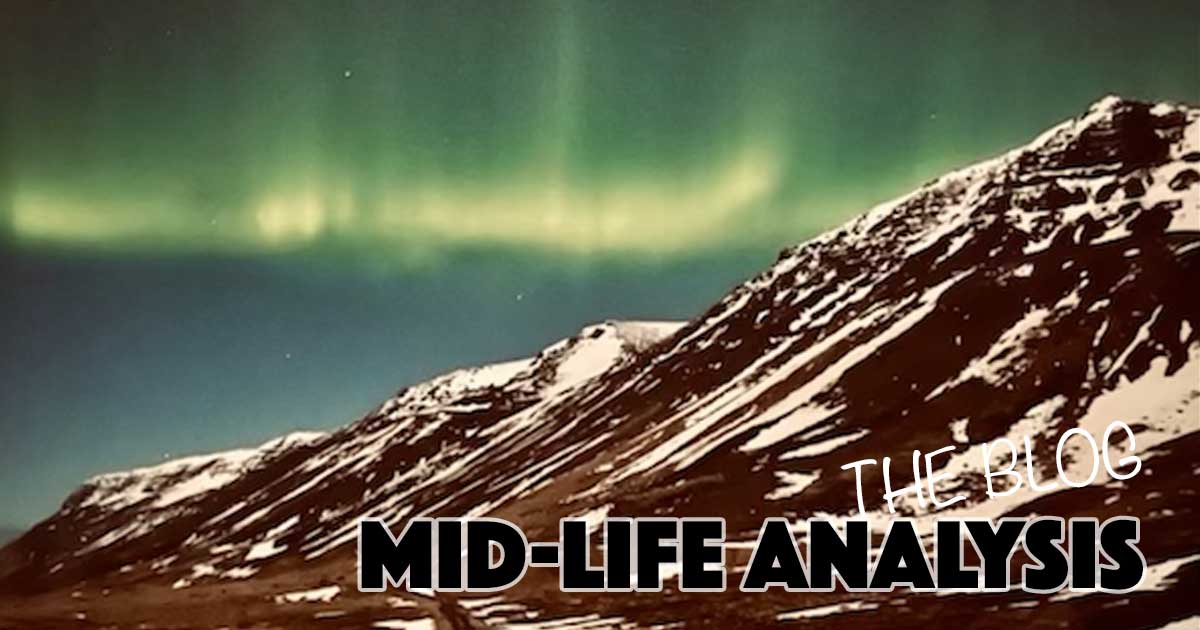The Lost Village of Discoursia

I recently had the privilege of going to Iceland with family. A beautiful country, and a wonderful trip…all around. We admired the sea, the mountains, waterfalls, wildlife, and of course the aurora borealis.
We even visited the Leggestein Stone, where my brother-in-law lifted the famous strongman monolith right off of the ground…while I struggled, strained, farted and fell. But there was some daylight underneath it, I swear!
All that said, there was one particular place we visited that’s had me thinking ever since. It was a very, very remote fishing village in the Westfjords called Discoursia. And as soon as we began to talk with the locals…the special nature of this village became clear.
You see, Discoursia has survived (incredibly) without much of the technology and influence of the modern world. Its residents are disconnected, for better or worse, from the world at large. No TV, no Internet (right?), and certainly no social media.
But it isn’t the incredible rarity of disconnection that makes Discoursians so special…it’s the affect that it has (and has had) on their culture.
Discoursians are remarkably connected. Their loyalty and trust in one another is immediately evident, and vital to their survival. Their communications are face to face. And what’s most interesting (and fascinating) about that communication is the method by which they share ideas and work through common problems.
I spoke to one of the town elders about their politics, their education services, and the way they cooperate for the common good…socially and economically. His name was Jorge, but everyone called him Cowboy.
Cowboy explained to me that in Discoursia, group decisions were made by rational and respectful debate. He said that parents raised their children to think critically, to be open to new ideas, but to challenge those ideas with the heart of a curious servant.
He told me that when there were significant and important differences of opinion…that no matter how critical the subject matter was, that Discoursians did their very best to put their egos aside, to remove emotional clouds in judgement, and to focus on what was truly best for their families…all families.
I said, “what happens when one of your leaders is proven to be wrong?”. His response? They admit they were wrong, they accept the better idea, and they move forward for the greater good.
I said, “what happens when you can’t find consensus on a key issue?”. His response? Our people agree to disagree, remain respectful, and continue to look for a common solution. Meanwhile, they do their best to move forward with the best solution available…until that consensus is truly found.
I said, “what happens when one person claims to have been offended?”. His response? We put that offense in perspective, we discuss its merits and decide if something should be done. But most times, we tell that person that they aren’t entitled to live a life without offense.
I said, “what about hate speech?” His response? We can separate hate from criticism. Words themselves cannot do harm. We teach our children that in order to preserve their right to voice their own beliefs, they must learn to tolerate that which might make their own blood boil. Freedom of expression comes with responsibility, and it takes very little intelligence to label all criticism as hate.
I said, “what about cancel culture or the risk of being cancelled?”. His response? What does that mean?
I said, “what happens when someone lies purposely for their own gain?”. His response? We do not bear false witness. It is perhaps the gravest of sins.
I said, “what happens when you challenge the ideas of another?”. His response? We debate the issue with logic and with the intention to serve our community and families, and whatever the conclusion… we are all better for it. We teach our children to be open to different viewpoints, but to challenge them with reason and respect. It is what makes us Discoursian.
I said, “Thank you Cowboy… Some people would call your village primitive, but to me it is far more advanced than most. I’ve heard stories in my own country, of the type of communication your people use to do what’s best, and what’s right, for your future. But those stories have been reduced to legend and folklore.
In my country, rational debate is gone. It’s been replaced by victimhood and personal agenda.
He said, “what happens when one of your leaders is proven to be wrong?”. My response? Often, they deny it…or refuse to discuss it. Or they construct a new lie to distract from any wrongdoing or error. There is no willingness to concede any opinion that isn’t in lockstep with their personal or party agenda.
He said, “what happens when you can’t find consensus on a key issue?”. My response? Discussions often turn into nothing more than ad hominem attacks.
He said, “what happens when one person claims to have been offended?”. My response? Those who question the offense are labeled as bigots. Real victims are marginalized for the good of those who claim to be offended by issues that sell television ratings. The new offendees are often rewarded with an instant and unsubstantiated status of virtuosity, and with channels of attention that feed their egos and fill their wallets. But in reality, they are being manipulated by those who wish to polarize our society for their own gain.
He said, “what about hate speech?” My response? Any criticism or challenge to an idea, no matter how sound the logic or abundant the evidence, can now be considered hate speech.
He said, “can you tell me more about this ‘cancel culture’?” My response? You really don’t want to know.
He said, “what happens when someone lies purposely for their own gain?”. My response? It depends on who hears the lie. In their own echo chambers, they are rewarded. For many are more concerned with destroying those with opposing views, than holding those in their own ranks accountable.
He said, “what happens when you challenge the ideas of another?”. My response? Too often, the discussion turns to anger and vitriol. Emotion and ego cloud the conversation and manifest as the refusal to listen, and the willingness to do nothing more than shout insults and claim offense.
I fear this is especially true among the young people in our society. Their intolerance for opposing views seems to have been born through their parent’s unwillingness to teach them to be intellectually critical of, yet open to opposing views… or to be critical in any way of their own beliefs or behaviors.
When you are never taught how to be wrong, you will never accept being wrong…even in the face of reason, and logic and evidence. And when consensus is difficult (or even impossible), as it is with many issues we face, your desire for tolerance and respect will only ever be reciprocated by your respect and tolerance for others.
He said, “wow… Please forgive me for saying this, but your country seems like a terrible place to live.” So I said…
No, Cowboy, it is wonderful.
It is a place full of incredible people that simply wish to live their lives and pay forward their good fortune. Admirable people who are open to ideas, and gain pleasure from the growth that happens when we learn from one another.
“But how can that be, if you have no ability to communicate? How can your society advance, or even survive?”
I can explain, Cowboy…but I have to take a step backwards. You see, all of these issues that I’ve pointed out, they tend to come from a select minority. A small percentage of our people who have somehow hijacked a majority of our attention.
Politicians, celebrities, media members and those with the power and resources to control our national narrative. And to create a climate of division, instead of debate.
But there is hope.
Our country can return to the stories of folklore that my grandparents used to tell. We can return to a method of idea exchange that isn’t sensational, but Socratic.
But it requires a commitment to teaching our children how to communicate. Like your people. “Discoursian” if you will.
And I will start with my own children. I will teach them this method of cooperative dialogue and debate.
But I need a shorter term for this… Discoursian Method.
Any ideas?

